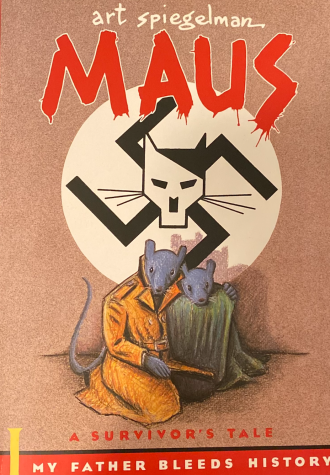Book Banning Needs to Be Banned

An image of the pages of books being burned in a growing fire.
February 11, 2022
Whether for sexual content, violence, racism, or a plethora of other reasons, the written word has always been under fire. Today, particularly in the American South, censorship is at an all-time high and Tennessee has been at the center of such controversy.
On January 10th, the McMinn County School Board in Athens, Tennessee voted to remove the graphic novel Maus by Art Spiegelman from its school’s curriculum. The book is the first graphic novel to be awarded the Pulitzer Prize and the premise of the two-volume text, originally published in 1980, seems odd at first: a graphic novel about the author’s own father’s experience in the Holocaust. However, the minimalist art style coupled with the poignant dialogue is a tribute to how powerful unconventional writing can be in dealing with difficult stories.

I first read Maus when I was in 8th grade (the same grade that it used to be read in the McMinn County School) and while certain scenes were definitely disturbing at times, I find it infinitely more disturbing that it should be banned. The story reveals the horrors of Nazi Germany as well as the intergenerational trauma many children of survivors face. Building on common Nazi propagandist imagery, the book depicts Jews as mice (or maus) and cats as Germans in order to explain in basic terms the dynamic and hierarchy that the Nazis created. The book also utilizes comic-book-style in-your-face text to illustrate the inescapability of the events. I was introduced to this book in Hebrew school. Every week, we would read a few pages of the book to keep on the pace of finishing one volume per semester. I vividly remember the professor talking about the importance of reading this text as to assure that a tragedy like this should never be allowed to be forgotten.
What I find most alarming about the banning of this book is that it was not banned over the graphic depictions of death, nor was it banned over the horrific torture the Nazis inflicted, but over some images of nudity (which is mouse nudity, by the way) as well as over the occasional cursing. This school district was going to ban a Holocaust book over cursing!

In addition, some parents expressed concerns over the book depicting the US in a negative light as the US put off joining WWII until 1941. In an interview this week in Times of Israel, Spiegelman, the author of Maus said, “[You] have to watch your words so you don’t offend somebody who might be unhappy about their grandfather being a Klansman, who might be unhappy and embarrassed about some of the things America has done in its history.” He also called the banning “dangerous,” an attempt to try to warp history to fit a certain narrative.
Continuing with the trend of banning freedom of speech, Tennessee has also gotten publicity over a pastor burning certain books which he deemed sacrilegious. Some of the books that were thrown into the pit include Harry Potter and Twilight due to their themes of “witchcraft.” The pastor, Greg Locke, claimed that he has “a constitutional right and a Biblical right to do what we’re going to do tonight,” Locke has already been under attack for his anti-LGBTQ and anti-vax commentary, with some now comparing his most recent controversy to the Nazi German book bannings. Something that I found interesting about this book banning was how instead of banning such explicit books as Fifty Shades of Grey or any scientific novels about the pandemic, Locke decided to burn books about vampire romance.
In response to the burning, a gay couple took to social media to post a video of themselves burning the Bible and yelling “Hail Satan!” I see this as a message regarding the harm of fighting fire with fire (literally).
Book burning, whether to shield the world from the horrors of reality, or to prevent people from being exposed to a fake one, can only have detrimental effects. In the age of misinformation, it is crucial to give everyone’s ideas a fair chance of being spread.

















































































































































